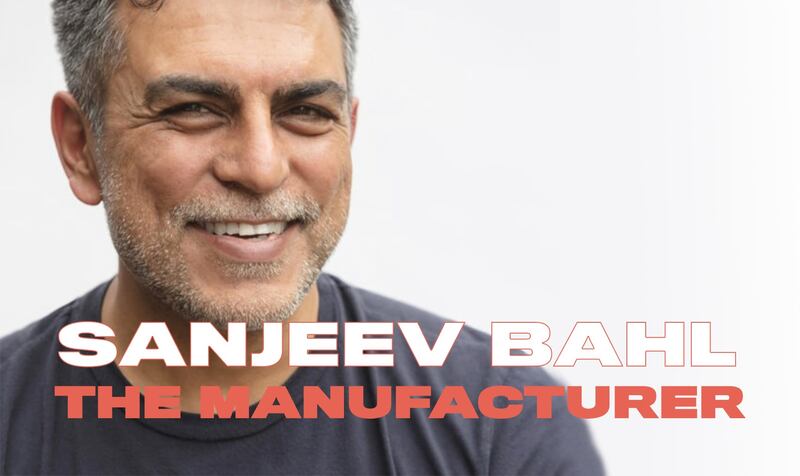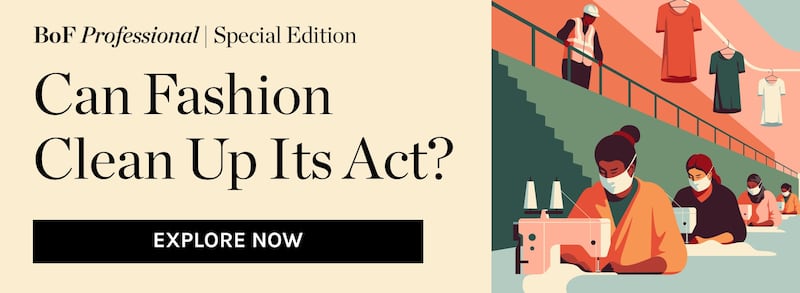
The Business of Fashion
Agenda-setting intelligence, analysis and advice for the global fashion community.

Agenda-setting intelligence, analysis and advice for the global fashion community.

The author has shared a YouTube video.
You will need to accept and consent to the use of cookies and similar technologies by our third-party partners (including: YouTube, Instagram or Twitter), in order to view embedded content in this article and others you may visit in future.

As part of our latest Special Edition, BoF has produced a series of video articles with entrepreneurs and business owners on how to build a responsible business. Hear from The Rebel, The Upcycler, The Anti-Consumptionist, The Manufacturer and The Social Good Brand and explore the Special Edition here.
LONDON, United Kingdom — For Sanjeev Bahl, the founder of Vietnam-based sustainable denim producer Saitex International, Covid-19 has forced the fashion industry into a much-needed reset.
“It will be a bit of a pause and this pause is welcome — not for the pain it's created, but we all had to slow down,” he told BoF.
Bahl founded Saitex, now the world’s most sustainable large-scale denim producer, in 2001. The Blue Sign Approved, Fair Trade, LEED-certified and B Corp certified company’s commitment to circularity and carbon neutrality have helped it build a client list including Everlane, Madewell, J.Crew, Target and G-Star Raw.
ADVERTISEMENT
In response to the pandemic, Bahl had to furlough 498 of Saitex’s 4,100 employees. (The business has taken a 20-to-25 percent hit and has gone from producing 20,000 pairs of jeans daily to around 15,000.) But he plans on re-hiring 500 employees under Saitex’s social entrepreneurship factory, Rekut, which focuses on hiring disadvantaged youths. The factory, which Bahl calls his “greatest joy,” began production at the end of April and is currently manufacturing face masks for donation.
While it hasn’t been easy, the business is getting by and moving ahead with deals and commitments to its cause and long-term strategy. Here’s how Bahl is going about it.
Redefine what success means for you. Bahl defines Saitex's purpose as "equally balanced between environmental, social and fiscal justice." Rather than subscribing to the "GDP school of thought" as a businesses — by focusing on output as a metric for success — he thinks along the lines of GPI (genuine progress indicator), which takes into account negative externalities of growth like the value of labour and impact on the environment. "That pushes businesses like us to be very responsible," he said.
Playing the long game pays off. Saitex has stayed committed to being a circular and carbon neutral organisation in spite of the crisis, but Bahl reckons these values have helped the business stay relevant. His long-term approach to investment and value creation — from opening Saitex's own fabric mill in Vietnam this year to a Los Angeles site that will launch this summer — has allowed it to stay relevant, aiming for circularity, speed-to-market and transparency rather than short-term gains. In early May, the business went ahead with a deal for seven megawatts of renewable and solar energy, which will allow it to reduce its carbon footprint by 25 percent.
Responsible manufacturing isn't about how much you produce but how you go about it — production vs. productivity, in Bahl's words. "If you look at production, you start gravitating from one zone to the next [and] start finding places which are cheaper than the next. Productivity is a completely different ballgame." For Saitex, this means considering investments in radical resource productivity, green chemistry, biomimicry, artificial intelligence and automation methodologies. But it also means social productivity: with the aforementioned Rekut program, Bahl has committed to growing it to encompass 20 percent of Saitex's workforce — around 800 young adults who will hail from disadvantaged, vulnerable, marginalised backgrounds.
Grow with the next crisis in mind. Saitex's focus on amping up efficiency without compromising on sustainability has paid off and kept the company agile — a saving grace in hard times. "We've managed to work with our clients and push out certain deliveries to level the production flows that allow all our associates to work six days a week. It's not a big hold where you're overproducing and then you don't have work for one full month." Much of this comes down to a considered approach to growth. If the business was driven by profits and greed, Bahl reckons five out of six factories running would have been forced to shut down. Instead, he urges entrepreneurs to be "really mindful of what [it means] be relevant and what is the right size and the right product mix and the right partner mix to circumnavigate through difficult times."

BoF Professional Special Edition: Can Fashion Clean Up Its Act?
As the world grapples with an unprecedented public health and economic crisis, exposing deep-rooted social inequality as a climate emergency looms, the fashion industry must learn to respect both people and the planet. It's time for fashion to build a more responsible business model. Explore the full special edition here.
ADVERTISEMENT
1. Can Fashion Clean Up Its Act?
2. Will Fashion Ever Be Good for the World? Its Future May Depend on It
3. How to Avoid the Greenwashing Trap
4. Luxury Brands Have a 'Respect Deficit' with Indian Artisans
5. Investing in the Sustainability Sisterhood
6. Why Luxury Came to the Rescue
7. The BoF Podcast | Jochen Zeitz on the Power of Fashion to Drive Sustainable Change
and more.
The BoF Professional Summit: How To Build a Responsible Fashion Business
On June 17 2020, we will gather leading global experts, entrepreneurs and activists in sustainability, ethical supply chains and workers' rights for a half-day programme of interactive conversations, panel discussions and workshops on building a responsible business, led by BoF's expert editors and correspondents. Space is limited. Register now to reserve your spot.
If you are not a member, you can take advantage of our 30-day trial to experience all of the benefits of a BoF Professional membership. Click here to join.
The Los Angeles-based accessories label has been a well-kept secret in the industry, but founders Yang Pei and Stephanie Li are hoping to change that through new acquisitions, opening brick-and-mortar stores and using AI to speed up the design and production process.
Designer Carly Mark sparked conversation about what it takes to make it as an emerging designer in New York when she announced she was shutting her ready-to-wear line and moving to London. On Thursday she held her last sample sale.
To stabilise their businesses brands are honing in on what their particular consumer wants to buy, introducing new categories and starting conversations.
That’s the promise of Zellerfeld, a 3D-printing partner to Louis Vuitton and Moncler that’s becoming a platform for emerging designers to easily make and sell footwear of their own.